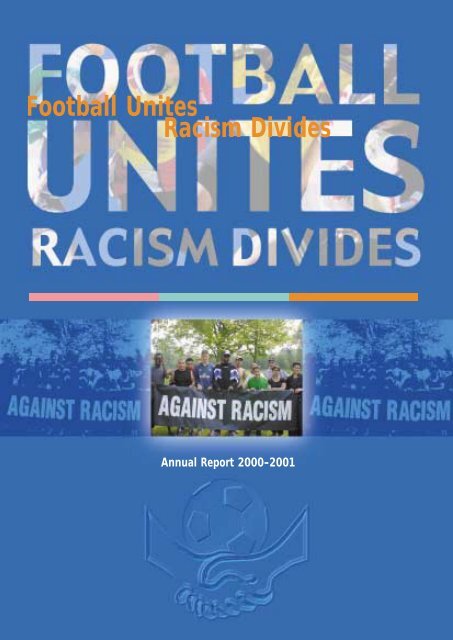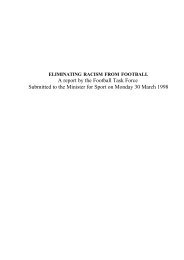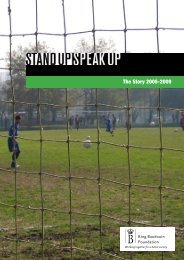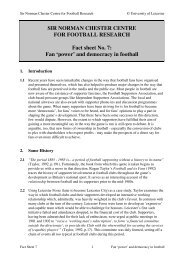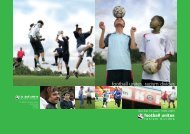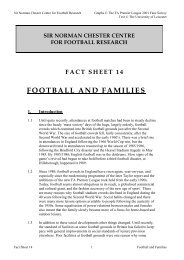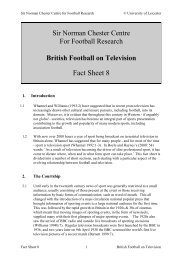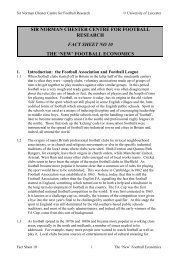FURD Annual Report - Football Unites - Racism Divides
FURD Annual Report - Football Unites - Racism Divides
FURD Annual Report - Football Unites - Racism Divides
Create successful ePaper yourself
Turn your PDF publications into a flip-book with our unique Google optimized e-Paper software.
<strong>Football</strong> <strong>Unites</strong><br />
<strong>Racism</strong> <strong>Divides</strong><br />
<strong>Annual</strong> <strong>Report</strong> 2000-2001
Contents:<br />
Foreword p.3,<br />
Introduction p.4/5<br />
Increasing ethnic minority<br />
participation in football p.6/10<br />
Ethnic minority women<br />
in football p.11<br />
Reducing racial harassment p.12/13<br />
Anti-racist education p.14/16<br />
Resources and information p.17/19<br />
Millennium Volunteers p.20/24<br />
National and International work p.25<br />
Looking Forward p.26
Foreword<br />
As this report goes to print towns and cities across the north of England are<br />
picking up the pieces from a series of riots precipitated by young men<br />
expressing their dissatisfaction with their immediate environment, economic<br />
prospects and in defence of their communities against racist attacks.<br />
The nature of this discontent and its expressions has brought about a plethora of analysis widely aired in the<br />
media and on the streets. A depressing picture of exclusion, segregation and denial of opportunities has begun to<br />
emerge. All the more depressing because we've been here before in different parts of the country and with<br />
different constituencies of young men.<br />
The links between young people rioting and the work of a project such as <strong>Football</strong> <strong>Unites</strong>, <strong>Racism</strong> <strong>Divides</strong> may not<br />
be immediately obvious but in the spirit of examination and recommendations for future good practice the<br />
achievements of the project and similar groups should not be ignored.<br />
<strong>Football</strong> <strong>Unites</strong>, <strong>Racism</strong> <strong>Divides</strong> (<strong>FURD</strong>) has been working with different sections of its local community to tackle<br />
social and racial exclusion for a number of years. The projects outlined in the pages of this <strong>Annual</strong> <strong>Report</strong> detail<br />
the extensive nature of their work and the different groups of people whom the project has sought to engage.<br />
Through building effective working partnerships with football fans, young people from all backgrounds, local Black<br />
communities and footballing institutions at all levels, alongside city-wide and regional statutory organisations,<br />
<strong>FURD</strong> has been able to translate a widespread passion for football amongst client groups into meaningful and<br />
effective anti-racist interventions.<br />
So through educational work in schools and organised youth groups, street activities with young people through<br />
Streetkick, reaching out to adult football fans through the United Colours of <strong>Football</strong> fanzine and www.furd.org, the<br />
mentoring and empowerment of young people through Millennium Volunteers, Sharrow United and Somali Blades,<br />
and by offering a stake in their local communities to individuals who came as refugees, the project illustrates how<br />
it is possible to overcome differing but related problems of exclusion.<br />
The lessons are clear and transferable. At the crux of it is the analysis that progress comes through working in<br />
real partnership with communities. Moving forward with the agendas of those communities and individual clients<br />
to the fore. In contrast the immediate lessons to be drawn from rioting youths may not be so clear, but it if these<br />
principles formed the starting point of action elsewhere who knows where we could go?<br />
Piara Powar<br />
National Co-ordinator, ‘Kick It Out’<br />
July 2001.<br />
3
4<br />
Introduction<br />
The relationship between ‘race’<br />
and football takes a number of<br />
forms. It has long been the case<br />
that a number of fans have used<br />
Saturday afternoons at football<br />
matches to air their racial<br />
prejudices but it is now recognised<br />
that this minority of racist fans is<br />
only part of the problem. What is<br />
also important is how Black and<br />
Asian people become involved in<br />
football as players, coaches or<br />
spectators, the interest they take in<br />
football and whether in certain<br />
areas they feel excluded. A third<br />
issue is the relationship between a<br />
professional football club and its<br />
local community; that is, whether<br />
the association is of mutual<br />
advantage or one-sided.<br />
Sheffield United <strong>Football</strong> Club is<br />
based at Bramall Lane, which is<br />
one of the oldest existing sports<br />
grounds in the world. The local city<br />
council ward, Sharrow, has an<br />
ethnic minority youth population of<br />
44%; however only one percent of<br />
the crowd at a Sheffield United<br />
home game against Bolton<br />
Wanderers on 22 November 1996<br />
were Black or Asian. According to<br />
research undertaken by Sheffield<br />
Hallam University in 1996, twenty<br />
percent of local ethnic minority<br />
residents had suffered regular<br />
racial harassment on match-days.<br />
A common reaction to this was for<br />
residents not to be seen outside<br />
before, during and after matches<br />
so as not to attract attention.<br />
‘<strong>Football</strong> <strong>Unites</strong>, <strong>Racism</strong> <strong>Divides</strong>’<br />
(<strong>FURD</strong>) believes that football, as<br />
the world’s most popular game,<br />
can help bring people together –<br />
people from different backgrounds,<br />
to play, watch and enjoy the game,<br />
and to break down barriers created<br />
by ignorance or prejudice.<br />
The partnership project has its<br />
origins in a small group of Sheffield<br />
United fans and youth workers,<br />
who in the early 1990s began to<br />
voice their concerns around a<br />
number of issues connected with<br />
their local football club, including<br />
racism.<br />
The partners are a unique mix of<br />
fans, football club, local city council<br />
officers, youth and community<br />
groups, racial equality council,<br />
schools, church, police and<br />
community safety units. They<br />
consist of:-<br />
• Sheffield United <strong>Football</strong> Club<br />
• Blades Independent Fans’<br />
Association<br />
• Sheffield United Supporters’<br />
Club<br />
• <strong>Football</strong> Supporters’<br />
Association<br />
• South Yorkshire Police<br />
• The Hub African-Caribbean<br />
Centre<br />
• Abbeydale Asian Youth Project<br />
• Sheffield Wednesday <strong>Football</strong><br />
Club<br />
• Sheffield Race Equality Council<br />
• Abbeydale Grange School<br />
• Sheffield Youth Service<br />
• Somali Blades <strong>Football</strong> Club<br />
• Sheffield and Hallamshire<br />
County FA<br />
case study<br />
Sheffield/Derbyshire border 1997<br />
Kevin Titterton, <strong>FURD</strong> volunteer<br />
and designer/builder of the<br />
‘Streetkick’ mobile<br />
football game<br />
“My name is Kevin Titterton and I’m a 38 year<br />
old Sheffield United supporter/sufferer. My<br />
involvement with the project began after a<br />
spell as a volunteer worker with the FSA’s Sheffield Fans’<br />
Embassy during Euro 96, and following a contribution I made<br />
to a discussion around the problems of racism in football at<br />
the 1996 AGM of the Blades Independent Fans’ Association.<br />
This led to my being invited to join the newly-formed project as<br />
a volunteer, which allowed me to tackle something that’s<br />
always been important to me and to serve a community that<br />
has always been special to me. That community, Sharrow,<br />
incorporates the home of The Blades, and it’s where I spent<br />
the early part of my life.<br />
<strong>Football</strong> <strong>Unites</strong> has allowed me to work in a field that I would<br />
probably have never done so, had the project not presented<br />
the opportunity. For someone with a passionate love of<br />
football, (but saddled with soccer skills that would not trouble<br />
the Queen Mother were she keeping goal for the opposition), it<br />
has allowed me to be involved in the Sharrow United Regional<br />
Alliance Sunday League side, to feel part of a team and its setup.<br />
I have been able to assist and learn from the setting up of<br />
a remarkable library and resource facility, that will ensure the<br />
promotion and objectives of our work are achieved through the<br />
education side of the project. I also feel as a family we have<br />
profited from the project as David, my son, has been involved<br />
in much of the project, in particular as a Streetkick volunteer.<br />
This has given him much social awareness and education as<br />
well as allowing father and son to do something different, but<br />
rewarding, together”.
Bramall Lane, February 1997<br />
<strong>FURD</strong>’S AIMS<br />
The partnership was established in<br />
November 1995, and its stated<br />
aims are:-<br />
1. To ensure that people who play<br />
or watch football can do so<br />
without fear of racial abuse and<br />
harassment, in either a verbal<br />
or physical form.<br />
2. To encourage all those<br />
associated with Sheffield United<br />
<strong>Football</strong> Club to improve<br />
standards of behaviour,<br />
especially in relation to racial<br />
abuse, harassment and<br />
discrimination.<br />
3. To create greater access for<br />
local black people through their<br />
active and safe participation<br />
both as players, staff and<br />
supporters.<br />
In January 1996 a bid for funding<br />
from the European Commission<br />
Cities Against <strong>Racism</strong> Project was<br />
successful, and a full-time Project<br />
Co-ordinator was soon appointed,<br />
with the official launch taking place<br />
at Sheffield United <strong>Football</strong> Club on<br />
30 April 1996.<br />
In December 1996 the initial 12<br />
months’ funding from the EC was<br />
extended for a second year, with<br />
additional funding coming from the<br />
South Yorkshire Police Community<br />
Initiatives fund, as well as in-kind<br />
help, in terms of premises, utilities<br />
costs, communication and staff<br />
supervision from the Sheffield<br />
Youth Service. <strong>FURD</strong> moved into its<br />
present premises, the Stables<br />
Youth Project, in April 1997.<br />
With the project in danger of<br />
running short of money in late<br />
1997, a lifeline was provided by the<br />
Sheffield Single Regeneration<br />
Budget (SRB), who began partfunding<br />
<strong>FURD</strong> in December 1997,<br />
and indeed are scheduled to<br />
financially support the project until<br />
2002.<br />
Income from the hire of both<br />
<strong>FURD</strong>’s mobile football game<br />
‘Streetkick’ and the History Of<br />
Black <strong>Football</strong>ers Exhibition,<br />
enabled us to continue our work<br />
once the European grant ended,<br />
with additional help coming from<br />
the Churches Commission For<br />
Racial Justice, ‘Kick It Out’, Home<br />
Office Community Relations Unit,<br />
Professional <strong>Football</strong>ers<br />
Association, Commission For Racial<br />
Equality, The <strong>Football</strong> Association,<br />
Sheffield TEC, Royal Mail, Walkers<br />
Crisps, Grant Thornton<br />
Accountants, Heeley Development<br />
Trust, and finally, from donations<br />
from individuals joining the <strong>FURD</strong><br />
membership scheme.<br />
In May 1999 the <strong>Football</strong> <strong>Unites</strong>,<br />
<strong>Racism</strong> <strong>Divides</strong> Educational Trust<br />
(<strong>FURD</strong> Ed) was established, and<br />
charitable status achieved later<br />
that year. All of <strong>FURD</strong>’s work with<br />
the exception of Millennium<br />
Volunteers, is now managed by<br />
<strong>FURD</strong> Ed.<br />
1999 was a key year for <strong>FURD</strong>, with<br />
three-year funding being awarded<br />
by the National Lotteries Charities<br />
Board for the educational work of<br />
the project, from the Department of<br />
Education and Employment to<br />
operate the <strong>FURD</strong> Millennium<br />
Volunteers programme, and from<br />
the European Commission to design<br />
and maintain the <strong>Football</strong> Against<br />
<strong>Racism</strong> in Europe (FARE) website.<br />
In July 2000 <strong>FURD</strong> Ed began<br />
working with the Shirecliffe Youth<br />
Inclusion Project, with funding from<br />
the Home Office ‘Positive Futures’<br />
initiative, to fund coaching in the<br />
Shirecliffe and Burngreave areas of<br />
Sheffield, a second ‘Streetkick’, and<br />
a peer mentoring programme.<br />
<strong>FURD</strong> agreed a Development Plan<br />
in February 2000, which set eight<br />
priorities for the project during<br />
2000. These priorities were then<br />
used for a more specific Action<br />
Plan, and are as follows:-<br />
• Increase the participation of<br />
ethnic minority young people<br />
in football as players,<br />
spectators and employees.<br />
• Significantly increase the<br />
participation and involvement<br />
of ethnic minority young<br />
women.<br />
• Reduce racial harassment.<br />
• Challenge racism through antiracist<br />
education.<br />
• Develop the work of the<br />
Resources and Information<br />
Centre.<br />
• Increase the participation of<br />
volunteers in the work of<br />
<strong>FURD</strong>, especially young people<br />
aged 16 to 24.<br />
• Develop regional, national and<br />
international initiatives.<br />
• Secure the future work of<br />
<strong>FURD</strong>.<br />
This report will use these eight key<br />
priorities as a means of reporting<br />
the work of <strong>Football</strong> <strong>Unites</strong>, <strong>Racism</strong><br />
<strong>Divides</strong> in the year 2000.<br />
Howard Holmes,<br />
Project Co-ordinator.<br />
5
6<br />
Increasing Ethnic<br />
Minority Participation<br />
in <strong>Football</strong><br />
COACHING AND<br />
COACH DEVELOPMENT<br />
<strong>FURD</strong>’s head coach is Chilean Luis<br />
Silva, who played professionally in<br />
Argentina, Brazil and Peru, before<br />
escaping from Pinochet’s torture<br />
squads, eventually arriving in<br />
Sheffield in 1975 as a political<br />
refugee. Luis runs free weekly<br />
sessions in Heeley, Fir Vale and<br />
Shirecliffe, as well as coaching<br />
Sharrow United. Several promising<br />
young players have been<br />
recommended to the Sheffield<br />
United School of Excellence and<br />
three boys have been taken on by<br />
the Blades. Desbon Bushiri, an<br />
exciting young striker and asylum<br />
seeker from Burundi, attended a<br />
<strong>FURD</strong> summer coaching session<br />
and was referred to Sheffield<br />
United by Luis. Desbon has since<br />
played three times for the<br />
reserves.<br />
<strong>FURD</strong>’s other regular coach is<br />
Ahmed Abdi Jama, who played 266<br />
matches for Somalia in the 1960’s<br />
and 70’s. He went on to coach<br />
both the youth and full national<br />
teams of Somalia, but the civil war<br />
intervened and in 1989 Jama<br />
applied for political asylum after<br />
working in Brazil. Jama gained his<br />
UEFA ‘B’ licence in Denmark, and<br />
now coaches for <strong>FURD</strong> in<br />
Broomhall and Burngreave, mostly<br />
with Somali youth.<br />
In 2000, 25 <strong>FURD</strong>-sponsored young<br />
people successfully completed the<br />
FA’s Junior Team Manager course,<br />
whilst Paul Lawrence and Fayaz<br />
Khan went on to achieve the<br />
Coaching Certificate. In addition<br />
Abbas Shah and Zahid Saleem<br />
qualified as Class 3 referees.<br />
<strong>FURD</strong> has identified the lack of<br />
local, safe, all-weather facilities as<br />
a major obstacle to ethnic minority<br />
young people progressing further<br />
in football. We are working in<br />
partnership with community<br />
groups, schools, and Sheffield<br />
Leisure Services to consult, plan,<br />
and secure funding to radically<br />
improve this situation as quickly as<br />
possible.<br />
case study<br />
Desbon Bushiri leaves<br />
the pitch after scoring a<br />
goal on his debut for<br />
Sheffield United reserves<br />
Desbon’s story “I arrived at my Shoreham Street<br />
flat, behind Sheffield United’s Kop, in July 2000. I<br />
didn’t know anybody in Sheffield. After a few days<br />
I started to look for somewhere to play football.<br />
Eventually I found Mount Pleasant Park in Sharrow, where<br />
Luis Silva and Keith Ward (MV) were running the <strong>FURD</strong><br />
summer coaching scheme. Luis saw me playing with a ball,<br />
and liked what he saw.<br />
Soon I met Kamran (MV) and Alan from <strong>FURD</strong>, who were<br />
starting a new Sunday league team,’Sharrow United’. They<br />
signed me up for the team, and as a Millennium Volunteer,<br />
and I scored two goals in our first game, which we won 3-1.<br />
Next Luis recommended me to Sheffield United and I trained<br />
with the juniors, and played 3 times for the reserves, scoring<br />
on my debut against Bury.<br />
After 4 months, United decided they would not offer me a<br />
contract. I was very disappointed, but soon met Tommy<br />
Spencer, who signed me to play for Matlock Town in the<br />
Unibond First Division.<br />
I’ve met lots of different people at <strong>FURD</strong>, whereas in my own<br />
country, Burundi, I was often afraid of people I didn’t know.<br />
<strong>FURD</strong> has given me a lot of help, and it’s nice to come to The<br />
Stables to meet everyone, and read books from the library.<br />
I have a special memory of driving with Howard to the grave<br />
of Arthur Wharton, about 30 kilometres from Sheffield, and<br />
laying some flowers on his headstone.<br />
I still hope to become a professional footballer, but I worry<br />
about my family back home. I am the first-born, and I pray<br />
that we will soon be together, safe”.
<strong>FURD</strong> coaches<br />
Luis Silva (left) and<br />
Ahmed Abdi Jama (right)<br />
case study<br />
<strong>FURD</strong> coaches, Luis and Jama (Extract from an<br />
article by Peter Markie in the Sheffield Telegraph,<br />
February 2000)<br />
Meet Ahmed Abdi Jama, from Somalia, and Luis-Eduardo Silva, from<br />
Chile, who between them have clocked up thousands of miles<br />
escaping torture and injustice until fate handed them cards to meet<br />
up unbelievably in Sheffield. Under, in fact, the umbrella provided by<br />
<strong>Football</strong> <strong>Unites</strong>, <strong>Racism</strong> <strong>Divides</strong>.<br />
So how did Jama and Silva, from worlds apart find common ground<br />
in South Yorkshire? Well Silva arrived first, 25 years ago, having<br />
previously played for Chile and as a midfielder professionally in<br />
Peru, Brazil and Argentina. That pedigree didn’t prevent torture as a<br />
prisoner under Pinochet’s dictatorship and escape to England in<br />
1975 as a political refugee.<br />
He surfaced in a North Derbyshire village and worked as a miner<br />
until the pit closures. Silva decided education was the way back and<br />
coaching was another driving force. At Sheffield College he gained<br />
certificates in sport and recreation with distinction and through the<br />
offices of MP Richard Caborn, the powerfully-built Chilean was<br />
directed to <strong>FURD</strong> to help out in sessions.<br />
Jama, a shorter, lighter character, played 266 matches for Somalia at<br />
centre forward with a tally of 92 goals. He was leading scorer in the<br />
1975 African Cup. In the 1980’s he coached both the youth and<br />
national teams of Somalia.<br />
Something of a legend in his own country, he looked further afield in<br />
1989 when he took up a coaching post in Rio de Janeiro. At this<br />
point, with civil war breaking out in Somalia, he knew he wouldn’t be<br />
safe to return home and requested political asylum at the UN.<br />
Result: A refugee camp in Copenhagen. His wife and four children<br />
joined him in Varde and he started out trying to win a new reputation<br />
as a coach with teams across Denmark.<br />
With Alslev he had success on the pitch and won over the locals with<br />
his dedication, never missing a training session. On one occasion he<br />
went by moped from Varde to Alslev arriving with his face turning<br />
white from the frost! He heard from friends in Sheffield and visited<br />
on holiday. “I was immediately struck by the number of Somali<br />
youngsters playing football but without proper organisation or<br />
coaching.”<br />
Luis Silva coaching<br />
in Shirecliffe<br />
Jama, now 56, has passed his UEFA B coaching licence and is desperate to<br />
forge a new career in England. He is currently helping <strong>FURD</strong>, Sheffield<br />
United School of Excellence and Somali youngsters in the Burngreave area.<br />
Can they make it here? “All we ask,” says Silva, “is the chance to prove<br />
ourselves. If we don’t make it for whatever reason, at least we can say we<br />
had the opportunity.”<br />
7
8<br />
CONCESSIONARY TICKET SCHEMES<br />
One of the main means by which Sheffield United have been able to<br />
contribute to the achievement of the project’s objectives has been the<br />
ticket distribution scheme in conjunction with <strong>FURD</strong>. The initiative has<br />
enabled hundreds of local Black and Asian young people to experience a<br />
live professional football match, leading to an increase in self-confidence<br />
and security amongst those attending, shown by the number of<br />
participants who have made return visits!<br />
The value of the ticket initiative was shown in December 2000, when the<br />
club ticket office, having decided that no free tickets would be available for<br />
the local derby with Sheffield Wednesday, worked out a system which<br />
enabled 30 local Black and Asian Unitedites to pay for their tickets in<br />
advance through <strong>FURD</strong>.<br />
In 2000, perhaps related to the appointment of Owls fan Alan Rhodes to<br />
the post of Youth Worker with <strong>FURD</strong> Ed, the project has also distributed<br />
free tickets for a Sheffield Wednesday game. Finally, Barnsley <strong>Football</strong><br />
Club provided complimentary tickets for all the finalists in <strong>FURD</strong>’s<br />
‘Streetkick’ tour of Barnsley in the spring.<br />
case study<br />
Abbas Shah: I have been involved with '<strong>Football</strong><br />
<strong>Unites</strong>' for a number of years. Initially contact was<br />
minimal, when I received complimentary tickets<br />
for Sheffield United home games. However as I<br />
became more aware of the objectives of <strong>FURD</strong> and<br />
what their involvement was within the<br />
community, I decided to approach them for help.<br />
In the first instance, <strong>FURD</strong> was able to send myself and a<br />
colleague on an FA Coaching Course with a view to setting<br />
up a local Asian-based football team, Highfield FC. Upon<br />
completion of the course <strong>FURD</strong> provided training equipment<br />
for coaching the team, and helped us obtain lottery and<br />
council funding. Once the season had started <strong>FURD</strong> donated<br />
further match equipment.<br />
During May 2000 <strong>FURD</strong> were able to send me on a FA<br />
referees course, which I successfully completed and passed.<br />
I have been refereeing every Saturday this season in the<br />
Sheffield leagues, and suffered all the highs and lows a<br />
match official can go through! I am hoping to achieve my<br />
Grade 2 status for the 2000/1 season.
Blades Enterprise<br />
Centre<br />
SHARROW<br />
PARTNERSHIP<br />
Sharrow United celebrate promotion in their first season<br />
<strong>FURD</strong> is a member of the Sharrow<br />
Partnership, which is made up of<br />
representatives from Sheffield<br />
United <strong>Football</strong> Club, Sharrow<br />
Community Forum, Sheffield College,<br />
<strong>FURD</strong>, Asian Welfare Association 96,<br />
and the Federation of Stadium<br />
Communities. Its combined efforts<br />
have brought in £1.8 million in<br />
grants, as well as helping secure<br />
planning permission for the Blades<br />
Enterprise Centre and Community<br />
Hall, which will open in 2001.<br />
The Blades Enterprise Centre has<br />
set targets for the number of local<br />
and ethnic minority small businesses<br />
that it needs to attract as clients,<br />
and a Community Hall for use by<br />
local residents will be situated<br />
underneath the corner of the Kop<br />
and John Street stand. It is<br />
anticipated that a hotel will follow<br />
the completion of the BEC, and the<br />
Sharrow Partnership has developed<br />
plans to ensure that local people<br />
receive the relevant training<br />
required for the jobs that will come<br />
with the ground development. <strong>FURD</strong><br />
played a key role in the drawing up<br />
of Sheffield United’s equal<br />
opportunities policy, which was<br />
formally adopted in May 1999.<br />
The Sharrow Partnership has gained<br />
a national reputation as a model for<br />
other clubs and their communities to<br />
follow, and the 2000 conference of<br />
the Federation of Stadium<br />
Communities was held at Bramall<br />
Lane.<br />
SHARROW UNITED AND<br />
HIGHFIELD FC<br />
<strong>FURD</strong> has worked hard to create<br />
the necessary conditions which will<br />
encourage Black and Asian teams<br />
to set up and join organised local<br />
leagues. These efforts bore fruit<br />
during 2000 when two teams,<br />
Highfield FC and Sharrow United,<br />
affiliated to the Sheffield and<br />
Hallamshire County FA, and joined<br />
different Sunday leagues in time<br />
for the 2000-1 season. <strong>FURD</strong><br />
provided support in the shape of<br />
coaching, venue hire, league and<br />
FA affiliation fees, balls and kit.<br />
Highfield FC are made up mainly of<br />
older Asian players, who have been<br />
able to organise themselves, whilst<br />
Sharrow United are the younger<br />
side. Indeed many of the Sharrow<br />
United players have signed up as<br />
<strong>FURD</strong> Millennium Volunteers, and<br />
the <strong>FURD</strong> Youth Worker has shared<br />
club secretary duties with MV<br />
Kamran Khan.<br />
case study<br />
Kamran Khan : Kamran<br />
has been involved with<br />
<strong>FURD</strong> for over 5 years. He<br />
made contact with the<br />
project through a <strong>FURD</strong><br />
Soccer School in a local<br />
park while he was still at<br />
school.<br />
He has carried out over 300<br />
hours voluntary work with <strong>FURD</strong><br />
as a Millennium Volunteer in the<br />
last year.<br />
During this period he has trained<br />
as a Junior Team Manager as<br />
well as taking up the role of<br />
Trainee Secretary for Sharrow<br />
United FC. He is also a regular in<br />
the team. Kamran represented<br />
<strong>FURD</strong> as part of a Pakistani team<br />
which travelled to Italy in<br />
June/July 2000.<br />
Together with his close friend<br />
Idris Amin, he made a Video<br />
Diary about his love of Sheffield<br />
United that was filmed live at the<br />
Fulham home game for the<br />
National <strong>Football</strong> Museum in<br />
Preston. He began watching The<br />
Blades by getting tickets through<br />
<strong>FURD</strong>’s Concessionary Ticket<br />
Scheme.<br />
Kamran and Idris were also<br />
contributors to a BBC<br />
documentary about Asians in<br />
<strong>Football</strong> and have attended<br />
meetings of the National Civil<br />
Rights Movement. He recently<br />
moved from long-term<br />
unemployment into work at two<br />
local schools as an Assistant<br />
Learning Mentor. 9
10<br />
The Streetkick Experience - by Ralph Hancock<br />
StreetKick is one of the great stadiums of the World<br />
more dreams per square centimetre than the Maracana<br />
and it fits in anywhere<br />
anywhere can be Bramall Lane, Hillsborough<br />
Sharrow or Sheffield Show<br />
where the roar of the crowd is hip-hop from Hoodz<br />
the competition is ‘taking ferrets for a walk for 50p’<br />
Streetkick is free<br />
the ferrets are on leads<br />
(they are cute though)<br />
there’s a girl with a shirt with a number ‘9’<br />
and a name beginning ‘FE’<br />
I hoped it was FERRET but it was FERN<br />
STREETKICK<br />
Streetkick is <strong>FURD</strong>’s mobile football game. Measuring 12 metres by 8<br />
metres, with boards one metre high, the game can be erected on any flat<br />
surface. It is an excellent method of reaching significant numbers of young<br />
people with information about the anti-racist campaign in football. In 2000<br />
the number of events increased by approximately 50% (25 events,<br />
compared to 17 in 1999).<br />
Streetkick achieved a good geographical spread around the city. This<br />
included events at each of the Sheffield College sites, and being present at<br />
many of Sheffield’s large-scale events, such as the Sheffield Show, May<br />
Fest and Sharrow Festival. A number of Streetkick events have also been<br />
held outside the city, predominantly in Barnsley and Rotherham.<br />
Our 2 main aims in relation to<br />
Streetkick are:<br />
• Combating Disadvantage<br />
(targeting areas of high Black<br />
and ethnic minority<br />
populations - where young<br />
people get few opportunities to<br />
play in organised tournaments)<br />
• Anti-racist work/education<br />
(targeting areas with known<br />
racial tensions/problems).<br />
Re-emphasis of the anti-racist<br />
element is being addressed in a<br />
number of ways:<br />
• A short speech is delivered by<br />
a member of <strong>FURD</strong> relating to<br />
what the organisation ‘stands<br />
for’.<br />
• Examining ways of increasing<br />
anti-racist imagery during<br />
events – banners, flags,<br />
sidepanels etc.<br />
• The need to develop our own<br />
anti-racist material (and be<br />
less reliant on national<br />
organisations such as ‘Kick It<br />
Out’) has also been<br />
highlighted.<br />
Volunteer involvement has been a<br />
major success this year. A widerange<br />
of volunteers (particularly<br />
<strong>FURD</strong>’s Millennium Volunteers –<br />
MVs) have taken lead roles in the<br />
planning, organising and running of<br />
both high profile events such as the<br />
Sheffield Show and May Fest and<br />
also short-term projects like the<br />
work at Barnsley and Sheffield<br />
College.<br />
The involvement of young women<br />
has increased significantly on last<br />
year, with a small number of young<br />
women MVs being involved in<br />
events during the summer and a<br />
group of young women taking a<br />
lead role in running an event for<br />
the Indian Welfare Association at<br />
Barnsley in August.<br />
Chorus<br />
StreetKick the view from behind the net,<br />
families wind up their clockwork kids and set them<br />
loose<br />
watch their own<br />
one girl, ten guys<br />
StreetKick he kicks he kicks she waits<br />
she kicks and scores<br />
he, he and he kicks she waits<br />
she kicks just wide<br />
he, he and he tackle in a corner she waits<br />
they don’t tackle her<br />
StreetKick he kicks he kicks she waits<br />
she kicks and scores<br />
Chorus end<br />
The tour of Barnsley took place in<br />
March/April 2000, and consisted<br />
of 6 tournaments in different areas<br />
of the city, with the winners of<br />
each event progressing to a final at<br />
Barnsley <strong>Football</strong> Club (Oakwell).<br />
The tour was organised and run in<br />
partnership with the Multi-Agency<br />
Piloting Project Against <strong>Racism</strong><br />
(MAPP), consisting of the Police,<br />
Barnsley Youth Service and a<br />
number of other organisations –<br />
with the aim of increasing racial<br />
awareness/tolerance amongst<br />
young people city-wide.
Somali referee, Asian commentator ‘11-3’<br />
suddenly the whistle stops<br />
the microphone drops to the ground<br />
they can’t resist joining in with all<br />
the other kids in the World<br />
no names<br />
for five minutes<br />
drift in drift away<br />
you see through the net bulging with its catch,<br />
look no further for the energy<br />
that powers the tides<br />
The drown sound from the floodlit stadium<br />
as I arrive late for the match<br />
StreetKick immortalised<br />
in one of the four huge curling stones<br />
of the National Centre for Popular Music<br />
the aluminium skin is warm to the touch<br />
slowly rotating<br />
as it heats and melts the ice<br />
to a penalty shoot-out<br />
quickening<br />
Sharrow Junior Lasses win 2-1<br />
we take off like a flying saucer<br />
and have not come back to earth yet<br />
a boy with sublime skill wants to hide<br />
I want to disappear inside the photograph of Jimi Hendrix<br />
be there at the Mojo Club in Sheffield in 1967<br />
his autograph<br />
‘Stay Kool<br />
Jimi Hendrix<br />
Exp.’<br />
The boy can’t Jimi<br />
rolls his foot over the ball again and again he cannot lose<br />
I imagine the sound of one note of ‘The Star Spangled<br />
Banner’<br />
paradoxically free and trapped for ever<br />
I am imagining ‘Purple Haze’ at Maine Road and the sound<br />
of 5-1<br />
against the Scum<br />
free<br />
more than a decade in my head.<br />
Women in football<br />
<strong>FURD</strong> successfully bid for a grant from the <strong>Football</strong> Association to develop<br />
footballing opportunities amongst Asian women. As a result of this we<br />
have run a series of coaching sessions at both indoor and outdoor venues<br />
in Sheffield attended by ethnic minority women and girls.<br />
Four teams of young women from schools and youth groups played on<br />
Sheffield United’s pitch at Bramall Lane as part of the Community Day in<br />
July 2000. Off the pitch several of <strong>FURD</strong>’s female Millennium Volunteers<br />
were involved in the planning and running of the Community Day including<br />
creating anti-racist banners, working on the <strong>FURD</strong> information stall,<br />
contributing to the MV newsletter and performing on stage in the<br />
entertainments room.<br />
Since becoming an MV, one of our female volunteers took up a paid job<br />
with Sheffield College where her role was to encourage participation of<br />
Asian women students in sporting activities. Unfortunately funding<br />
problems have meant that this post has since ceased.<br />
A number of young women have taken part in Streetkick events. A girls’<br />
team from Sharrow Junior School beat 7 boys’ teams in a 3-a-side<br />
Streetkick tournament at the National Centre for Popular Music in Sheffield<br />
in October, that took place as part of the Lovebytes festival of sportsrelated<br />
arts events, and female Millennium Volunteers have been involved<br />
in running Streetkick tournaments.<br />
<strong>FURD</strong> has sponsored two more women to gain the <strong>Football</strong> Association<br />
Junior Team Managers Award, the first rung on the coaching ladder, joining<br />
the seven Asian women who successfully gained the Award in Sheffield in<br />
1999.<br />
11


